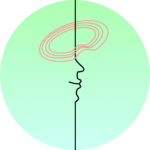Understanding Perception: How We Interpret the World Around Us
Cognitive psychology delves into how our minds process and interpret the stimuli we encounter daily.

The Foundation of Cognitive Psychology
Cognitive psychology is a branch of psychology concentrated on the intricate processes of the human mind. It explores how people understand, process, and store information. This field emerged in the mid-20th century as psychologists began to reject behaviorist theories, which focused solely on observable behaviors, and instead turned their attention to the internal mental processes. Cognitive psychology covers a variety of topics, including perception, memory, language, problem-solving, and thinking. These processes are vital for understanding human behavior because they shape how individuals interact with the world.
One of the primary interests of cognitive psychologists is how people perceive the world around them. This involves studying the sensory processes that translate external stimuli into internal representations. Furthermore, cognitive psychology investigates how these representations are stored and retrieved, providing insight into how memory functions. By understanding these processes, cognitive psychologists aim to develop a greater comprehension of human cognition and its impact on behavior.
The Role of Perception in Cognitive Psychology
Perception is a crucial aspect of cognitive psychology, as it involves the interpretation of sensory information to form an understanding of the environment. This process is complex and encompasses various elements such as visual, auditory, and tactile perception. Cognitive psychologists study how these sensory inputs are processed by the brain, leading to the formation of meaningful perceptions.
The process of perception involves several stages, including sensation, attention, and interpretation. Sensation refers to the initial detection of stimuli through sensory organs. Attention determines which stimuli are focused on and processed further. Interpretation involves assigning meaning to these stimuli, allowing individuals to make sense of their surroundings. These stages highlight the complexity of perception and its importance in cognitive psychology.
Memory and Its Cognitive Processes
Memory is another vital component of cognitive psychology, as it involves the storage, retrieval, and use of information. Memory processes are essential for learning and decision-making. Cognitive psychologists study different types of memory, such as short-term, long-term, and working memory, to understand how information is stored and retrieved.
Short-term memory allows individuals to retain information temporarily and is crucial for immediate tasks. Long-term memory, on the other hand, involves the permanent storage of information, enabling individuals to recall past experiences and knowledge. Working memory is a combination of short-term memory and attention, allowing individuals to hold and manipulate information for various tasks. Understanding these memory processes provides insight into how people learn and make decisions.
Language and Its Cognitive Implications
Language is a fundamental aspect of human cognition, as it facilitates communication and understanding. Cognitive psychology examines how language is processed and acquired, shedding light on its role in human thought. This area of study explores language development, comprehension, and production, seeking to understand how language shapes cognition.
Language acquisition involves learning the rules and structures of language, which is a complex process influenced by both genetic and environmental factors. Cognitive psychologists study how individuals understand and produce language, focusing on the mental processes involved. This includes syntax, semantics, and pragmatics, which contribute to the understanding and use of language in various contexts. By examining these processes, cognitive psychology offers a deeper understanding of how language influences thought and behavior.
Problem Solving and Decision Making
Problem-solving and decision-making are essential cognitive processes that allow individuals to navigate complex situations. Cognitive psychology investigates how people approach and resolve problems, as well as the factors that influence decision-making. This area of study explores the strategies and heuristics used to solve problems, providing insight into human cognition.
Problem solving involves identifying a problem, generating potential solutions, and selecting the most effective one. Cognitive psychologists study the mental processes involved in each stage, examining how people use logic and creativity to solve problems. Decision-making, on the other hand, involves selecting a course of action from available options. This process is influenced by various factors, including emotions, biases, and past experiences. By studying these cognitive processes, psychologists aim to understand how individuals make decisions and solve problems effectively.
Conclusion
Cognitive psychology offers valuable insights into the complex processes of the human mind, particularly how we perceive, remember, and interpret the world. Understanding these cognitive processes is essential for comprehending human behavior and interactions. Through the study of perception, memory, language, and problem-solving, cognitive psychologists strive to unravel the intricacies of human cognition. This knowledge not only enhances our understanding of the mind but also informs practical applications, such as improving educational methods and developing interventions for cognitive impairments. By exploring these cognitive domains, we gain a deeper appreciation of the human mind and its remarkable capabilities.
